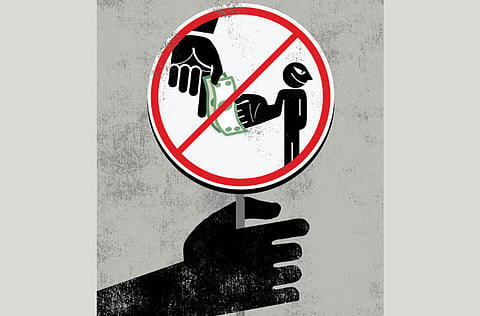Corrupt regimes beware
Internationalisation of anti-corruption movement may explain some of the changes

Riots across Tunisia, December 2010. Demonstrations in Moscow, December 2011. Fasts and street marches in New Delhi, March 2012 — plus street movements in Slovenia, Quebec, Iraq, Azerbaijan and Wuhan, southern China, among others, throughout the past two years. What do they all have in common? The answer is corruption, or rather the desire to end corruption, which is now the primary motivating factor in dozens of political movements around the world.
Of course many of the recent riots, strikes, street demonstrations and political turmoil have other sources too. But even in Tunisia, where protesters questioned the very legitimacy of the regime, political anger was fuelled by stories of President Zine Al Abidine Bin Ali, his wife and their relatives — as well as their hotels, factories and real estate, sometimes expropriated from other people, and usually exploited with connections and outright extortion. The riots that followed were anti-regime, anti-corruption and anti-repression, all at once.
In Russia, last winter’s protesters, likewise, made no distinction between their repressive political system and the corruption of their political class. On the contrary, as their leaders have argued, the one exists in order to feed the other. Alexei Navalny, the most prominent member of this new generation of Russian “dissidents,” explains bluntly on one of his websites dedicated to local and municipal corruption that his work is necessary “because pensioners, doctors and teachers are practically starving while the thieves in power buy ever more villas, yachts and the devil knows what else”. Although Russians still allude to the ideals of the past — last December, one Moscow demonstrator carried a “We need a Havel” placard — Navalny does not talk much about human rights or democracy. Instead, he talks about money: Who has it, who stole it, who misspent it, who smuggled it out of the country.
In this sense, he has much in common with the Chinese communists who officially expelled the provincial leader Bo Xilai a few months ago. Bo’s wife stands accused of murder and Bo himself of taking large bribes. As well as Liu Zhijun, a former minister accused of taking more than $100 million (Dh367.8 million) in kickbacks during the construction of China’s overpriced high-speed railways.
“Reform,” in Russia and China, is not about human rights or not only about human rights. It is about getting people to stop stealing. As China’s new anti-corruption chief told his colleagues, the party’s survival depended upon it.
However, corruption is hardly a new issue in China, Russia, India, Slovenia, Azerbaijan or anywhere else. Why has it come to the forefront of so many political struggles now? As the Economist argued last week, the internationalisation of the anti-corruption movement might explain some of the change. Pressure on corrupt politicians and businessmen now comes not only from within their own societies, but also from authorities enforcing America’s Foreign Corrupt Practices Act or Britain’s Bribery Act; from voluntary but rapidly growing industry groups, including the International Corporate Governance Network and the Extractive Industries Transparency Initiative; from activists such as Global Witness and Open Oil; and from campaigners in the mold of Bill Browder — the businessman who persuaded the US Senate to pass the Magnitsky Act, a law that denies American visas to Russian officials responsible for the torture and murder of a Russian lawyer, Sergei Magnitsky, who uncovered a massive tax fraud. Transparency International, once a small, quixotic organisation, publishes an annual corruption index, which is now scoured anxiously by leaders around the globe.
Of course, Amnesty International was once a small, quixotic organisation too. However, as the international human rights movement has grown in stature, authoritarian leaders have learned how to fight it. The human rights movement has been variously derided as “western” and thus alien to Chinese or perhaps “Asian” values, or else as “hypocritical,” originating in societies with problems of their own. The Iranian regime has welcomed “persecuted” historians who deny the Holocaust to conferences in Tehran, just to make that point.
Still in its infancy, the international anti-corruption movement has the potential to enhance and augment the human rights rhetoric enormously. Both movements rely on arguments about justice and the rule of law and both appeal to the human instinct for fairness. Though it probably will not be long before someone finds a way to cast “anti-corruption” as another form of western imperialism, for the moment at least, the movement’s other strength is its universalism — its arguments and tactics work in democracies as well as dictatorships. Indeed, they are more effective in societies where the public can at least vote the thieves out of office. One wonders whether their neighbours who cannot do so might soon feel jealous.
— Washington Post



